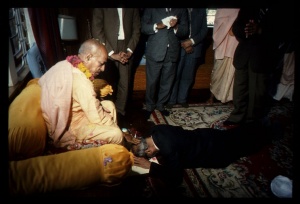SB 10.6.15-17: Difference between revisions
(Vanibot #0018 edit: make synonym terms in Sanskrit italic in SB - Vanisource) |
(Vanibot #0054 edit - transform synonyms into clickable links, which search similar occurrences) |
||
| Line 33: | Line 33: | ||
<div class="synonyms"> | <div class="synonyms"> | ||
''īṣā-mātra'' | ''[//vanipedia.org/wiki/Special:VaniSearch?s=īṣā&tab=syno_o&ds=1 īṣā]-[//vanipedia.org/wiki/Special:VaniSearch?s=mātra&tab=syno_o&ds=1 mātra]'' — like the front of a plow; ''[//vanipedia.org/wiki/Special:VaniSearch?s=ugra&tab=syno_o&ds=1 ugra]'' — fierce; ''[//vanipedia.org/wiki/Special:VaniSearch?s=daṁṣṭra&tab=syno_o&ds=1 daṁṣṭra]'' — the teeth; ''[//vanipedia.org/wiki/Special:VaniSearch?s=āsyam&tab=syno_o&ds=1 āsyam]'' — having a mouth in which; ''[//vanipedia.org/wiki/Special:VaniSearch?s=giri&tab=syno_o&ds=1 giri]-[//vanipedia.org/wiki/Special:VaniSearch?s=kandara&tab=syno_o&ds=1 kandara]'' — like mountain caves; ''[//vanipedia.org/wiki/Special:VaniSearch?s=nāsikam&tab=syno_o&ds=1 nāsikam]'' — the nostrils of whom; ''[//vanipedia.org/wiki/Special:VaniSearch?s=gaṇḍa&tab=syno_o&ds=1 gaṇḍa]-[//vanipedia.org/wiki/Special:VaniSearch?s=śaila&tab=syno_o&ds=1 śaila]'' — like big slabs of stone; ''[//vanipedia.org/wiki/Special:VaniSearch?s=stanam&tab=syno_o&ds=1 stanam]'' — the breasts of whom; ''[//vanipedia.org/wiki/Special:VaniSearch?s=raudram&tab=syno_o&ds=1 raudram]'' — very fierce; ''[//vanipedia.org/wiki/Special:VaniSearch?s=prakīrṇa&tab=syno_o&ds=1 prakīrṇa]'' — scattered; ''[//vanipedia.org/wiki/Special:VaniSearch?s=aruṇa&tab=syno_o&ds=1 aruṇa]-[//vanipedia.org/wiki/Special:VaniSearch?s=mūrdha&tab=syno_o&ds=1 mūrdha]-[//vanipedia.org/wiki/Special:VaniSearch?s=jam&tab=syno_o&ds=1 jam]'' — whose hair was the color of copper; ''[//vanipedia.org/wiki/Special:VaniSearch?s=andha&tab=syno_o&ds=1 andha]-[//vanipedia.org/wiki/Special:VaniSearch?s=kūpa&tab=syno_o&ds=1 kūpa]'' — like blind wells; ''[//vanipedia.org/wiki/Special:VaniSearch?s=gabhīra&tab=syno_o&ds=1 gabhīra]'' — deep; ''[//vanipedia.org/wiki/Special:VaniSearch?s=akṣam&tab=syno_o&ds=1 akṣam]'' — eye sockets; ''[//vanipedia.org/wiki/Special:VaniSearch?s=pulina&tab=syno_o&ds=1 pulina]-[//vanipedia.org/wiki/Special:VaniSearch?s=āroha&tab=syno_o&ds=1 āroha]-[//vanipedia.org/wiki/Special:VaniSearch?s=bhīṣaṇam&tab=syno_o&ds=1 bhīṣaṇam]'' — whose thighs were fearful like the banks of a river; ''[//vanipedia.org/wiki/Special:VaniSearch?s=baddha&tab=syno_o&ds=1 baddha]-[//vanipedia.org/wiki/Special:VaniSearch?s=setu&tab=syno_o&ds=1 setu]-[//vanipedia.org/wiki/Special:VaniSearch?s=bhuja&tab=syno_o&ds=1 bhuja]-[//vanipedia.org/wiki/Special:VaniSearch?s=uru&tab=syno_o&ds=1 uru]-[//vanipedia.org/wiki/Special:VaniSearch?s=aṅghri&tab=syno_o&ds=1 aṅghri]'' — whose arms, thighs and feet were strongly built bridges; ''[//vanipedia.org/wiki/Special:VaniSearch?s=śūnya&tab=syno_o&ds=1 śūnya]-[//vanipedia.org/wiki/Special:VaniSearch?s=toya&tab=syno_o&ds=1 toya]-[//vanipedia.org/wiki/Special:VaniSearch?s=hrada&tab=syno_o&ds=1 hrada]-[//vanipedia.org/wiki/Special:VaniSearch?s=udaram&tab=syno_o&ds=1 udaram]'' — whose abdomen was like a lake without water; ''[//vanipedia.org/wiki/Special:VaniSearch?s=santatrasuḥ&tab=syno_o&ds=1 santatrasuḥ] [//vanipedia.org/wiki/Special:VaniSearch?s=sma&tab=syno_o&ds=1 sma]'' — became frightened; ''[//vanipedia.org/wiki/Special:VaniSearch?s=tat&tab=syno_o&ds=1 tat]'' — that; ''[//vanipedia.org/wiki/Special:VaniSearch?s=vīkṣya&tab=syno_o&ds=1 vīkṣya]'' — seeing; ''[//vanipedia.org/wiki/Special:VaniSearch?s=gopāḥ&tab=syno_o&ds=1 gopāḥ]'' — the cowherd men; ''[//vanipedia.org/wiki/Special:VaniSearch?s=gopyaḥ&tab=syno_o&ds=1 gopyaḥ]'' — and the cowherd women; ''[//vanipedia.org/wiki/Special:VaniSearch?s=kalevaram&tab=syno_o&ds=1 kalevaram]'' — such a gigantic body; ''[//vanipedia.org/wiki/Special:VaniSearch?s=pūrvam&tab=syno_o&ds=1 pūrvam] [//vanipedia.org/wiki/Special:VaniSearch?s=tu&tab=syno_o&ds=1 tu]'' — before that; ''[//vanipedia.org/wiki/Special:VaniSearch?s=tat&tab=syno_o&ds=1 tat]-[//vanipedia.org/wiki/Special:VaniSearch?s=niḥsvanita&tab=syno_o&ds=1 niḥsvanita]'' — because of her loud vibration; ''[//vanipedia.org/wiki/Special:VaniSearch?s=bhinna&tab=syno_o&ds=1 bhinna]'' — were shocked; ''[//vanipedia.org/wiki/Special:VaniSearch?s=hṛt&tab=syno_o&ds=1 hṛt]'' — whose hearts; ''[//vanipedia.org/wiki/Special:VaniSearch?s=karṇa&tab=syno_o&ds=1 karṇa]'' — ears; ''[//vanipedia.org/wiki/Special:VaniSearch?s=mastakāḥ&tab=syno_o&ds=1 mastakāḥ]'' — and heads. | ||
</div> | </div> | ||
Latest revision as of 19:34, 17 February 2024

A.C. Bhaktivedanta Swami Prabhupada
TEXTS 15-17
- īṣā-mātrogra-daṁṣṭrāsyaṁ
- giri-kandara-nāsikam
- gaṇḍa-śaila-stanaṁ raudraṁ
- prakīrṇāruṇa-mūrdhajam
- andha-kūpa-gabhīrākṣaṁ
- pulināroha-bhīṣaṇam
- baddha-setu-bhujorv-aṅghri
- śūnya-toya-hradodaram
- santatrasuḥ sma tad vīkṣya
- gopā gopyaḥ kalevaram
- pūrvaṁ tu tan-niḥsvanita-
- bhinna-hṛt-karṇa-mastakāḥ
SYNONYMS
īṣā-mātra — like the front of a plow; ugra — fierce; daṁṣṭra — the teeth; āsyam — having a mouth in which; giri-kandara — like mountain caves; nāsikam — the nostrils of whom; gaṇḍa-śaila — like big slabs of stone; stanam — the breasts of whom; raudram — very fierce; prakīrṇa — scattered; aruṇa-mūrdha-jam — whose hair was the color of copper; andha-kūpa — like blind wells; gabhīra — deep; akṣam — eye sockets; pulina-āroha-bhīṣaṇam — whose thighs were fearful like the banks of a river; baddha-setu-bhuja-uru-aṅghri — whose arms, thighs and feet were strongly built bridges; śūnya-toya-hrada-udaram — whose abdomen was like a lake without water; santatrasuḥ sma — became frightened; tat — that; vīkṣya — seeing; gopāḥ — the cowherd men; gopyaḥ — and the cowherd women; kalevaram — such a gigantic body; pūrvam tu — before that; tat-niḥsvanita — because of her loud vibration; bhinna — were shocked; hṛt — whose hearts; karṇa — ears; mastakāḥ — and heads.
TRANSLATION
The Rākṣasī's mouth was full of teeth, each resembling the front of a plow, her nostrils were deep like mountain caves, and her breasts resembled big slabs of stone fallen from a hill. Her scattered hair was the color of copper. The sockets of her eyes appeared like deep blind wells, her fearful thighs resembled the banks of a river, her arms, legs and feet seemed like big bridges, and her abdomen appeared like a dried-up lake. The hearts, ears and heads of the cowherd men and women were already shocked by the Rākṣasī's screaming, and when they saw the fierce wonder of her body, they were even more frightened.